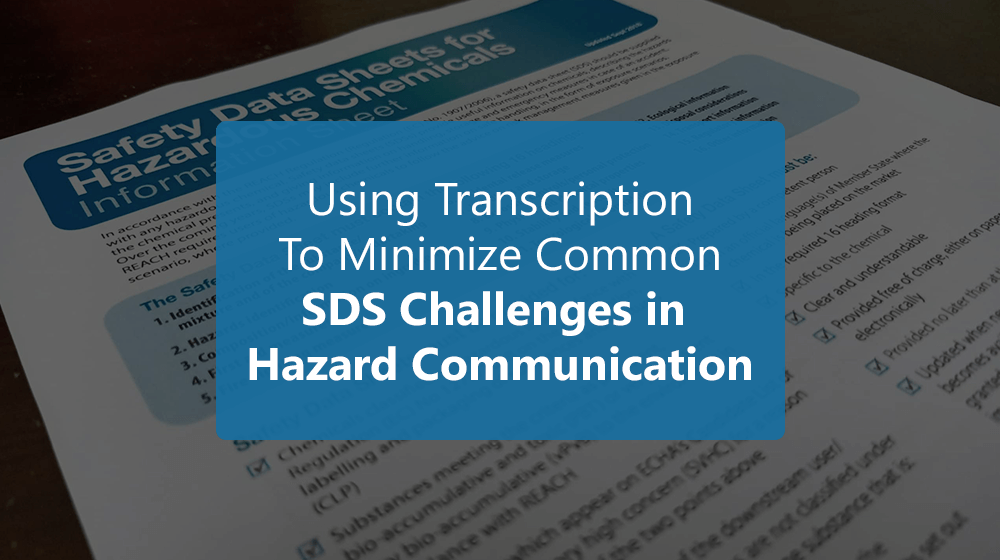Safety Data Sheets (SDS), formerly known as Material Safety Data Sheets (MSDS), are essential documents that provide critical information about hazardous chemicals. They outline the properties, potential hazards, and safe handling procedures of these substances. However, ensuring the accuracy, accessibility, and compliance of SDS can be a complex task, especially for organizations dealing with a large volume of chemicals.
SDS and Hazard Communication
Safety Data Sheets (SDS) are essential for workplace safety, providing clear information about the dangers of chemicals. They help prevent accidents, injuries, and illnesses by guiding workers on safe handling, storage, and emergency actions. SDS also ensures companies follow regulations like the Globally Harmonized System (GHS) and OSHA’s Hazard Communication Standard.
Agencies like the U.S. Environmental Protection Agency (EPA) also regulate SDS. The EPA requires companies to keep SDS updated and include them in their chemical inventories. This helps protect both workers and the environment by making sure chemical risks are properly communicated.
The Challenges With SDS
Once you understand the importance of SDS, it’s time to look at the challenges that manufacturers and distributors face. Some of the most common challenges include accessibility, language complexity, inaccuracy, and management of multiple SDS. Meeting the regional and global formatting standards also counts.
Regarding the solution part, professional transcription service providers can help minimize these challenges. Here’s how they can help:
Piles of Paper To Digital Safety
Consider a situation of chemical leak or any mishap where workers need immediate access to SDS. What if they need to find it among the bunch of files? This can complicate the situation and affect workplace safety. Transcription services for SDS come to tackle one of the most common problems with SDS, accessibility.
Professional transcripts convert sheets into easily accessible digital formats, making it easier for workers to gather information. In an ideal case, the standard digital document can be uploaded to the website or the application that workers use.
A digital copy is not hard to find and can save a lot of precious time during a crisis. Also, workers can go through these virtual documents during their leisure time to develop a better understanding of the products.
Eliminating The Silent Safety Risk
Another challenge that transcription can help with is a quick update of SDS. Updating these sheets is a regular practice but it is time-consuming without digital formatting. There can be instances where updated sheets reach a particular production unit later than others. This won’t be the same with digital files, much easier to share.
Also, professionals offering transcription services have identified the developing trends and finalized the updated documents for their clients. This keeps all the parties including stakeholders, distributors, workers, and customers on the same page.
Breaking Down The Jargon
Not everyone involved in the storage, management, and processing of chemical products has a rich technical or scientific vocabulary. Transcription services here simplify the complex terms and make SDS worth understanding. It also gives a clear understanding of chemical handling, boosting workers’ confidence.
This holds much importance if the SDS is curated with highly technical words and is to be reformatted for digital distribution. Transcription service provides a team of subject matter experts who work with an empathic approach and ensure that every complex term is understandable.
Developing a Digital Database
Managing hundreds or even thousands of SDS can be overwhelming for many companies. Without a proper system, important safety data can easily get lost, increasing the risk of accidents.
Transcription services offer a simple solution by creating a centralized digital database, making it easy to organize, store, and access SDS whenever needed. Instead of feeling buried under a mountain of paperwork, companies can now have all their safety data at their fingertips, ready for any situation.
Keeping Up With The Compliances
Not staying compliant with safety regulations can lead to costly fines or penalties, especially if your SDS doesn’t meet the required standards. Transcription services ensure your SDS are always accurate and up-to-date.
They also help meet Occupational Safety and Health Administration guidelines and GHS rules. This proactive approach reduces the risk of compliance issues, keeping your business safe from legal trouble.
Overcoming Language Obstacles
In workplaces with diverse languages, communication can be a challenge. If employees don’t fully understand the safety instructions in SDS, accidents are more likely to happen.
Transcription services can translate SDS into multiple languages, ensuring everyone is on the same page. This not only protects workers but also promotes a safer workplace by providing clear safety instructions for everyone, regardless of language.
Industry-Specific Hazard Communication Solutions
Effective Hazard communication through SDS is important for every industry dealing with chemicals. From transportation to healthcare, transcription services help with a diverse range of SDS challenges.
Construction: Data from the Bureau of Labor Statistics states that the mortality rate in the construction industry is on the rise, with 1069 workers losing their lives in the year 2022. Mishandling of chemical-based products used in the industry can be a possible cause. Accurate and accessible SDS can help prevent by emphasizing the smallest details that lead to bigger mishaps.
Manufacturing: The US has more than 12.7 million people employed in the manufacturing sector. The use of SDS becomes paramount because the industry deals with various types of chemicals. For this considerable size of employed workers, the SDS has to be updated and distributed at different stages of production.
Agriculture: A report by The National Institute For Occupational Safety and Health (NIOSH) reveals that physicians diagnose around 20,000 pesticide poisonings among the estimated 2 million U.S. agricultural workers. This can be due to inaccessible or poorly updated SDS. The industry needs accurate and accessible information for dealing with chemicals and protecting workers’ health.
Transportation: Drivers carrying chemicals and associated products need to remain extra cautious. With access to limited information, even a spill can create a disastrous situation. To overcome this, The Department of Transportation(DOT) has Hazardous Materials Regulations for drivers transporting hazardous materials. These regulations require proper documentation of transporting chemicals, including an accurate SDS for each hazardous material.
Healthcare: As per the Centre for Disease Control and Prevention (CDS), over 8 million US healthcare workers are exposed to harmful chemicals. SDS are a must for these workers as it affects their health. Having the right knowledge about the handling and disposal of chemical waste cannot be overlooked.
Energy Sector: In the U.S. energy sector, Occupational Safety and Health Administration ensures SDS compliance for worker safety, while the subordinate agencies monitor environmental risks from hazardous chemicals. SDSs are vital for safe handling, storage, and emergency actions, protecting both workers and the environment while preventing fines and maintaining organizational reputation.
Final Thought
Safety Data Sheets (SDS) are crucial for effective hazard communication and ensuring workplace safety. For manufacturers, maintaining accurate and easily accessible SDS is not just a regulatory requirement, but also essential for protecting the workforce. However, challenges such as limited accessibility, technical jargon, inconsistent formatting, and language barriers can make this task difficult. Transcription services can help overcome these obstacles by providing digital formats that are clear, accessible, and fully compliant with regulations.
At ANT Datagain, our team of experienced professionals understands the importance of SDS and has successfully supported a wide range of clients. You can rely on us to ensure your SDS documents are precise, accessible, and compliant.
















